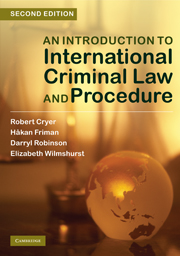Book contents
- Frontmatter
- Contents
- Preface to the Second Edition
- Table of Cases
- Table of Treaties and other International Instruments
- Table of Abbreviations
- PART A INTRODUCTION
- PART B PROSECUTIONS IN NATIONAL COURTS
- PART C INTERNATIONAL PROSECUTIONS
- PART D SUBSTANTIVE LAW OF INTERNATIONAL CRIMES
- PART E PRINCIPLES AND PROCEDURES OF INTERNATIONAL PROSECUTIONS
- 15 General Principles of Liability
- 16 Defences/Grounds for Excluding Criminal Responsibility
- 17 Procedures of International Criminal Investigations and Prosecutions
- 18 Victims in the International Criminal Process
- 19 Sentencing and Penalties
- PART F RELATIONSHIP BETWEEN NATIONAL AND INTERNATIONAL SYSTEMS
- Index
- References
15 - General Principles of Liability
from PART E - PRINCIPLES AND PROCEDURES OF INTERNATIONAL PROSECUTIONS
Published online by Cambridge University Press: 05 June 2012
- Frontmatter
- Contents
- Preface to the Second Edition
- Table of Cases
- Table of Treaties and other International Instruments
- Table of Abbreviations
- PART A INTRODUCTION
- PART B PROSECUTIONS IN NATIONAL COURTS
- PART C INTERNATIONAL PROSECUTIONS
- PART D SUBSTANTIVE LAW OF INTERNATIONAL CRIMES
- PART E PRINCIPLES AND PROCEDURES OF INTERNATIONAL PROSECUTIONS
- 15 General Principles of Liability
- 16 Defences/Grounds for Excluding Criminal Responsibility
- 17 Procedures of International Criminal Investigations and Prosecutions
- 18 Victims in the International Criminal Process
- 19 Sentencing and Penalties
- PART F RELATIONSHIP BETWEEN NATIONAL AND INTERNATIONAL SYSTEMS
- Index
- References
Summary
Introduction
The substantive definitions of crimes (on which, see Chapters 10–13) provide only a part of the picture of criminal liability. The general principles of liability apply across the various different offences and provide for the doctrines by which a person may commit, participate in, or otherwise be found responsible for those crimes. They include forms of liability such as aiding and abetting, which are familiar to all domestic criminal lawyers, as well as principles like command responsibility, which are specific to international criminal law. It is important to note at the outset that the various forms of liability not only have different conduct elements, but also different mental elements, and the extent to which principles of accomplice liability have been used in some cases to avoid high mens rea requirements for primary commission of international crimes has been controversial. Unlike in domestic law, where the traditional image of a criminal is the primary perpetrator such as the person who pulls the trigger, in international criminal law, the paradigmatic offender is often the person who orders, masterminds, or takes part in a plan at a high level. As a result, principles of liability play a comparatively large role in international criminal law.
This chapter will discuss the principles of liability from two points of view, the ambit of liability recognized in customary and conventional international law, alongside the appropriateness of those principles from the point of view of foundational principles of criminal law.
- Type
- Chapter
- Information
- An Introduction to International Criminal Law and Procedure , pp. 361 - 401Publisher: Cambridge University PressPrint publication year: 2010
References
- 1
- Cited by



